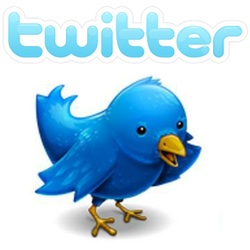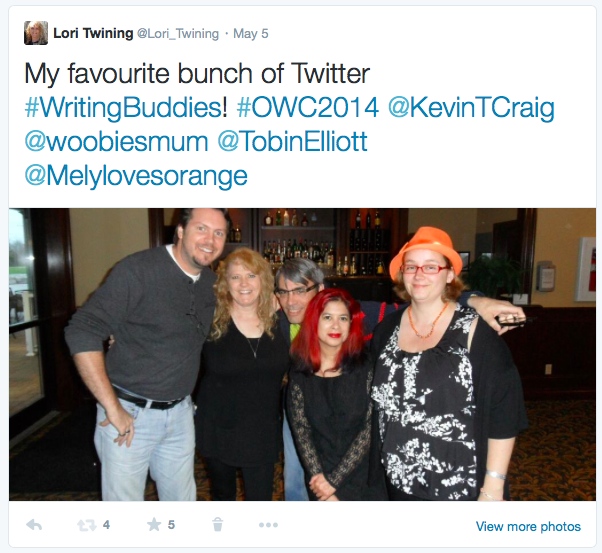
Basically, it's a small post or status update told in 140 characters or less, called a #Tweet. You can add pictures and videos to the message, if you like.
Twitter uses #Hashtags to make it easier for people to follow the the topics that they are most interested in, such as #writing...people who like to write, will check on this hashtag to see what other people are writing.
In 2009, an intelligent woman by the name of Johanna Harness started the hashtag #amwriting. I love this particular hashtag, because, a writer can always find someone else online, no matter what time of the day, no matter where you are in the World, and you can communicate with them. If you're having writer's block, jump on board and talk with someone else who either just experienced the same thing, or is struggling with it right beside you (virtually, of course).
At first when I joined Twitter, I must admit it was extremely overwhelming for me. Sure, I knew how to communicate with other social media sites, like Facebook, Pinterest, Blogging, etc., but Twitter was different. So many people collecting followers like they were playing a video game. I did sit back and watch for a while. I became friends with a few people that I actually knew already (my kids and a few friends) and watched what they had to say. Truthfully, most of them were using it as a chat line to talk to friends in the same room as them, at the same party, or in the same town. I wasn't interested in that. I wanted to meet other writers and authors. Why? Because, I like to call myself a writer, even though, I have a real paying job that I go to Monday to Friday 8-5 and sometimes, even longer than that. I have three busy kids who play sports everywhere and often. Enough said about that.
So, obviously, I didn't feel I had enough time to dabble in social media I knew nothing about, right?
Wrong. As a writer, this is the place to be. I strongly urge you to join Twitter and become a Tweeter.
Here are 10 Reasons Why Writers Should Be on Twitter:
- Editing Skills: Twitter forces a writer to condense their comment or ideas into 140 characters. Believe me, this is hard, if you are a novelist. 140 characters takes an extreme amount of editing skills. You must choose your words carefully. It helps you weed out all the unnecessary words in your work.
- Supporting Other Writers: Not only do you receive support from other writers, but you are able to give other writers support as well. You want them to succeed too. You can help each other by using writing tags like #amwriting, #WritingBuddies or #MustKeepWriting. Offer encouragement to each other and help celebrate their achievements. You are writing together, only many miles apart, or sometimes many continents apart.
- Network & Meet Other Writers: Networking with other writers is perfect when you are attending Writer Conferences around the World. After having several conversations with these writers online, you can meet up at conferences and you already have a friend. You seek each other out and you have someone to sit with...and be nervous with, while you wait to make your pitch to an agent. You are instant friends.
- Find Useful information: This is critical to a writers' life...finding more information on topics such as conference locations, writing contests, submission to writing anthologies, finding out about agents seeking certain manuscripts, writers' groups meeting in your area, online courses, furthering your education, etc. A wealth of information is at your finger tips. I like to call it an opportunity that you should not miss out on. Example: I just received news that I am being included in a writing anthology being published in the Fall, that I originally noticed on Twitter and Facebook. I figured, "What the heck, I'm going to submit something. No one will know that I'll get rejected but me and my hubby." So, I did it. I submitted and BAM! They accepted two pieces. Now, I'm doing the Snoopy Happy Dance around the house.
- Promote Your Own Writing: This bit of advice should be taken as a percentage of promoting yourself and others with a 20%-80% split. If you continuously promote your book 100% of the time, people will stop following you immediately. They already have your book, if they want it. If you tweet personal statuses, they are able to see you as a real person and they will eventually like you for you, and then they will check out your website link and find out you have books for sale. So, 20% should be about you and 80% regarding other people's work, by retweeting about them or what they have to say. Make friends.
- Inspiration & Motivation: You can find writing prompts from various established writers, like Sarah Selecky who offers up a daily writing prompt. You can get inspired by listening in on other writers conversation about their love for hockey, baseball, music, birds or flowers, etc. You can get pumped up and motivated by some of your virtual friends encouraging you to attend a conference with them (my favourite is the Ontario Writers' Conference in Ajax), or enter a short story contest or a 3-Day Novel Writing Contest like the Muskoka Novel Marathon (one of my favourite writing events of the year).
- Build your Writer Platform: A Writer Platform is something that takes time, and I don't mean hours or days, I mean years. The visibility you have as a writer is what will sell your writing. If you have your own website and you are blogging once a week or once a month, people will read your posts when you tweet them, post them to Facebook, etc. You will increase the traffic on your site, making a bigger readership. Don't think that once you finally get that huge publishing contract in your hand, that you will start promoting yourself then, because it takes years! Do it now, spend an hour or two a week tweeting, blogging, posting, whatever you need to do, to just get your name out there. People need to know your name. Believe me, when you show up at a writers' conference and someone looks at your name tag (yes, we all have to wear one)... and that person you have never met before, holds out their hand to you and says, "Oh, you are Lori Twining (insert your own name for a grandeur effect), I know that name. It's great to finally meet you!" Those three sentences will make your heart fill with happiness and you will be floating on clouds for the rest of the conference, not to mention blushing. This actually happened to me at conferences, and as I say, it made me feel so spectacular, that I turned around, tucking my shyness into my pocket and boldly confronted other writers that I recognized their names from social media, making them smile too. More instant friends.
- Keep up with the Publishing World: This is important to know where the publishing world is headed. Are e-books taking over? Should you forget about your dream of being published in a book format? You know, a book, you can hold in your hands and smell as many times as you want in a day? Literary Agents are posting to Twitter every day about the kinds of stories they are interested in reading & promotion. They are even posting courses they are running regarding how to get that agent, or how to approach an agent properly. They help you with your query letters. They make suggestions as to what you should be concentrating on to get published. All very important topics for a writer. I just signed up for a course in the States, being run by a Literary Agent living here in Canada. I met her three years ago at the Ontario Writers' Conference. She will personally edit 15 pages of my work and give me suggestions on how to make it better. If she thinks your writing is awesome, she will ask to see more. These little steps to networking with Agents and figuring out your craft are crucial to your Writers' Life.
- Learning Your Craft: I know you have been writing for years, but there is always something that you don't know about your own craft. I love following certain authors who give tips and suggestions about their writing life. It's not only informative but it gives you hope, and encourages you to carry-on with your writing. Sometimes, writers, and yes, I'm speaking from experience here, want to quit writing because you think your work sucks. Well, finding out someone like Stephen King or Chuck Wendig have moments of uncertainty, makes me feel better. I thought I was the only one out there in Writerland that has these "myworkisshitmoments".
- Job Opportunities: People laugh at me for tweeting and they say I'm wasting my time...BUT, if they only knew how many freelance writing jobs you can obtain while on Social Media. Seriously, businesses all over the planet are looking for help with writing their silly song jingles, their promotional material for selling their products. Twitter will help you find these jobs. Bottom line, you will finally come to the point where you will say, "Who needs that 8-5 paying job anymore, when I can stay home and make money from my office, doing something I love to do...and that's WRITE.

 RSS Feed
RSS Feed